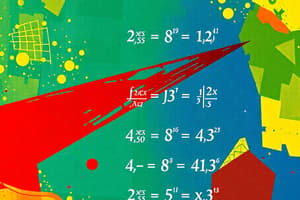Podcast
Questions and Answers
Which algebraic technique is used to factor expressions containing fractions by finding a common factor in the numerator and denominator?
Which algebraic technique is used to factor expressions containing fractions by finding a common factor in the numerator and denominator?
- Factoring odd degree polynomials
- Factoring by sum or difference of perfect squares
- Factoring out a common term
- Factoring by adding or subtracting fractions (correct)
What is the result of factoring the expression $x^2 + 8x + 16$?
What is the result of factoring the expression $x^2 + 8x + 16$?
- $(x - 4)^2$
- $(x + 4)^2$ (correct)
- $(x + 8)^2$
- $(x - 8)^2$
When factoring special cases, what is the result of factoring $4a - 4b$?
When factoring special cases, what is the result of factoring $4a - 4b$?
- $4(a + b)$
- $a^2 + 2ab + b^2$
- $4(a - b)$ (correct)
- $a^2 - b^2$
What is the technique used for factoring expressions by adding or subtracting fractions that share a common denominator?
What is the technique used for factoring expressions by adding or subtracting fractions that share a common denominator?
Can polynomials of even degree be factored over natural numbers?
Can polynomials of even degree be factored over natural numbers?
What is the process of grouping like terms, identifying common factors, and pulling them out to rewrite the expression in a factored form called?
What is the process of grouping like terms, identifying common factors, and pulling them out to rewrite the expression in a factored form called?
Which method is used to factor expressions of the form $ax^2 + bx + c$?
Which method is used to factor expressions of the form $ax^2 + bx + c$?
What is the result of factoring the expression $x^2 - 6x + 9$?
What is the result of factoring the expression $x^2 - 6x + 9$?
Which method should be applied to factor expressions of the form $a^3 - b^3$?
Which method should be applied to factor expressions of the form $a^3 - b^3$?
How can the expression $x^3 - 8$ be factored?
How can the expression $x^3 - 8$ be factored?
Study Notes
Factorization: Breaking Down Expressions into Simpler Forms
Factorization is a crucial concept in algebra that helps us simplify complex expressions by expressing them as products of simpler terms. This process is frequently used when solving equations, expanding products, or simplifying expressions involving variables. In this article, we'll explore different techniques used to factor expressions, including factoring by grouping, factoring trinomials, dealing with specific cases, and employing algebraic identities.
Factoring by Grouping
Factoring by grouping is the process of grouping like terms, identifying common factors, and pulling them out to rewrite the expression in a factored form. For example, consider the expression (x^2 - 6x + 9). We can group the first two terms to get ((x^2 - 6x) + 9). We can then factor out the common term (x) from the first two terms to obtain (x(x - 6) + 9). Finally, we can factor the quadratic expression inside the parentheses to get (x(x - 6) + 9 = x(x - 6) + 9(1) = (x - 3)(x + 3)).
Factoring Trinomials
Trinomials are expressions of the form (ax^2 + bx + c). Many trinomials can be factored using the following strategies:
- Factoring by difference of squares: (a^2 - b^2 = (a - b)(a + b)). For example, (x^2 - 9 = (x - 3)(x + 3)).
- Factoring by difference of cubes: (a^3 - b^3 = (a - b)(a^2 + ab + b^2)). For example, (x^3 - 8 = (x - 2)(x^2 + x + 4)).
- Factoring by sum or difference of perfect squares: (a^2 + 2ab + b^2 = (a + b)^2) or (a^2 - 2ab + b^2 = (a - b)^2). For example, (x^2 + 10x + 21 = (x + 3)^2).
Factoring Special Cases
- Factoring out a common term: (ab + ac = a(b + c)). For example, (6x + 3y = 3(2x + y)).
- Factoring odd degree polynomials: polynomials of odd degree cannot be factored over the natural numbers. However, they can be factored over other fields, such as complex numbers.
Factoring using Algebraic Identities
- Identifying rational expressions: Factor expressions containing fractions by finding a common factor in the numerator and denominator. For example, (\frac{x^2 + 6x + 9}{x + 3} = x + 3).
- Factoring by adding or subtracting fractions: Factoring expressions by adding or subtracting fractions that share a common denominator. For example, (\frac{1}{x - 2} - \frac{1}{x + 2} = \frac{(x + 2) - (x - 2)}{(x + 2)(x - 2)} = \frac{4}{x^2 - 4}).
Understanding these techniques and practicing them will help you become more proficient in simplifying expressions, solving equations, and expanding products in algebra. Factorization is a fundamental tool that is essential for mastering algebra, and it is the foundation upon which many more advanced concepts are built.
Studying That Suits You
Use AI to generate personalized quizzes and flashcards to suit your learning preferences.
Description
Test your understanding of factorization techniques in algebra, including factoring by grouping, factoring trinomials, handling special cases, and utilizing algebraic identities. This quiz will help you practice simplifying complex expressions, solving equations, and expanding products through factorization methods.



